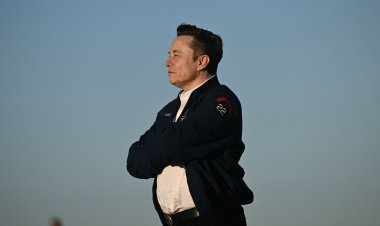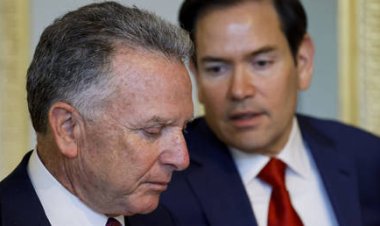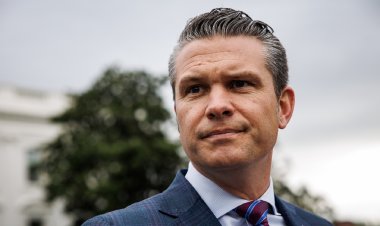Leaked tape turns LA City Council member into a fugitive in his hometown
Kevin de León's life on the run has prolonged a painful chapter for Los Angeles following the October release of the recording, which contained racist remarks.


LOS ANGELES — Making a rare public appearance, Los Angeles City Council Member Kevin de León was doling out free turkey in his district when he was forced to make an abrupt exit — protesters were on the way.
They have been chasing him all over this sprawling city since October, when a leaked recording surfaced in which de León and several colleagues spoke in racist terms as they schemed to carve up the city’s political boundaries to benefit Latinos.
De León stopped going to City Council meetings — though he made a brief attempt on Friday — to avoid the raucous demonstrations. He fled the bungalow he bought for nearly $1 million last year. A local women’s club hastily canceled a showing of “It’s a Wonderful Life” when protesters got word that de León would be there, apologizing in a handwritten note on the door.
“The council member has received death threats,” said spokesperson Pete Brown. “We’re actually hiring security to come to our tree lighting events.”
His life on the run has prolonged a painful chapter for Los Angeles following the recording’s October release. The episode has poisoned local politics just as Mayor Karen Bass takes office. Now, she’s forced to deal with the fallout in a city already confronting bitter divisions and an array of daunting challenges.
De León doesn’t appear to be going anywhere, no matter how hard others work to push him aside.
When de León tried on Friday to emerge from exile, showing up at a council meeting for the first time in 59 days, the hearing devolved into shouting, and enough fellow members walked out that the council went into recess. When the session resumed, the embattled council member was gone — and critics were slamming him again.
Later that night, de León was involved in an altercation at a holiday event in which he was captured on video grabbing a protester and pushing him into a table. Both de León and the protester, activist Jason Reedy, have filed battery reports against each other.
De León has apologized for his comments on the October recording, sort of. In a handful of media appearances, he sought to minimize and explain his remarks. And he’s tried to keep a low profile, to the extent that’s possible in an era of social media. What he hasn’t done is resign, despite calls for him to do so from President Joe Biden and virtually every Democratic politician in California.
Instead, the former longtime state legislator, who won the state Democratic Party’s endorsement for his 2018 challenge to Sen. Dianne Feinstein, is trying to withstand intense pressure and stick it out, at least through the last two years of his term — all while collecting a salary of about $218,000.
It just might work. De León remains relatively popular in his district, which includes the Eagle Rock and Boyle Heights neighborhoods — making a recall campaign a risky and costly endeavor.
“Recalls cost money, and they cost money out of our dollars, the people’s pockets,” said Maraky Alemseged, an organizer with the Black Alliance for Just Immigration — one of the activist groups that’s been pursuing de León around town. “For the people to have to put money, resources, energy, time into a recall election, to me it’s just unrealistic and it’s not right.”
In the meantime, de León has been seen by only a tiny fraction of Angelenos since Oct. 11. That’s when he and Council Member Gil Cedillo walked out of a council hearing besieged by protesters, soon after the public first learned of the recording that featured him along with Council President Nury Martinez, Cedillo and union leader Ron Herrera.
Herrera quickly resigned. Martinez, after some initial resistance, stepped down as well. Cedillo, with only a few weeks left in his term, quietly shuffled offstage. But de León, as part of the apology tour with select local media outlets, has presented a shifting defense.
The council member said the most offensive remark on the recording — in which Martinez referred to the adopted Black child of a fellow council member as a monkey — was not uttered by him, though he conceded he should have rebuked her in the moment. He sought to make the case that he was misinterpreted when he said that Council Member Mike Bonin, who is white, displays his child at public events like a handbag, claiming he was referring to the high-end accessories favored by Martinez. And he apologized for racist remarks Martinez and Cedillo made about people from the largely rural Mexican state of Oaxaca.
His explanation has not mollified critics.
“I think it’s extremely offensive and it makes me feel 100 percent uncomfortable,” said Claudia Oliveira, president of the Downtown Los Angeles Neighborhood Council, who is herself adopted. “Who is he to determine that he wasn’t being racist? That’s clearly racism.”
Still, there’s seemingly little that fellow council members or angry residents can do in the short term to oust him. Los Angeles officials say they lack the power to remove a sitting council member who has not been indicted on criminal charges, as two were in recent years. And a serious attempt to qualify a recall has yet to take shape, as the most vocal activists press for his resignation.
All this raises a question: Can de León stick it out?
The new council president, Paul Krekorian, rejected his request to be excused from attending meetings. De León continues to provide constituent services and doesn’t plan to let opposition stop him from attending council meetings, according to his spokesperson. He’s expected to attend the next council meeting on Tuesday.
“Ninety percent of the work that we do is specific to us, our council office,” said Brown, his spokesperson. “We work with departments. That work has continued throughout this situation.”
Protesters and some residents have pushed back on this characterization, complaining that district offices have largely been closed to walk-in services. Of de León’s four district offices on a recent weekday afternoon, only the Boyle Heights location was open, with staffers sitting at a table blocking the front door. Calls to the office’s phone numbers went unanswered.
When asked about the closed offices, Brown said that staff might have been working in the field, and that the table at the Boyle Heights location serves as a check-in desk.
If de León does indeed return again to City Hall this week, council meetings could again grind to a halt.
Melina Abdullah, co-founder of BLM-LA, said the group had secured commitments from some council members to break quorum if de León appears again. And ongoing protests that have at times resulted in officers blocking the entrance to council chambers would likely explode as they did on Friday, when officers had to break up a near-fight between an activist and a de León supporter.
A number of high-profile motions, including a plan to revitalize downtown Los Angeles, have stalled as members have been reluctant to vote on items authored by de León.
“That is a very bad situation for not just the community of [Council District 14] to be in, but for the whole city, because there’s business that is currently frozen and cannot move forward,” said Henry Perez, executive director of Lucha Action Fund, a Boyle Heights-based nonprofit.
Some groups in de León’s district, including the Downtown Los Angeles Neighborhood Council, say they are prepared to circumvent de León and seek out other council members to carry motions for the area. That process was most recently used after José Huizar was removed from the council following his indictment on bribery charges.
“I don’t think there’s anything prohibiting that,” said Hugh Esten, Krekorian’s communications director. “And under the circumstances, it seems like it would be advisable.”
A serious recall effort is still possible.
The East Area Progressive Democrats club is looking at all options for jettisoning de León, whom the group calls “ineffective and irrevocably damaged,” and it recently voted to authorize a recall effort, President Hans Johnson said. But, he added, activists are wary of trading de León for another product of a broken machine.
“This scandalous failure of representation is not happening in isolation,” Johnson said. “We have to reckon with a pattern of corruption and self-dealing that makes the actions of this council member all the uglier.”
Sacramento-based consultant Russell Lowery said he has been in contact with potential recall funders that include prominent Black and Latino business owners willing to commit “several hundred thousand dollars.”
“There’s a lot of people talking about it,” Lowery said. “It’s just whether or not the leaders want to pull the trigger.”
Even if the money materialized, Lowery said, potential backers must consider the political consequences. People who called for de León’s resignation would be pressured to take positions on the recall.
“Getting anything done in LA politics is all about coalitions,” Lowery said. “You’re not just taking on Kevin de León, you’re taking on anyone who is invested in that whole coalition.”
There’s also the matter of locating a successor. Los Angeles’ recall system requires potential replacements to appear on the same ballot as the targeted incumbent, and activists just finished the grueling process of cultivating and boosting 2022 candidates.
“His recall is next on the planning and execution for many LA and California progressives,” said Ludovic Blain, who heads the progressive fundraising hub California Donor Table, but they want a candidate “who can govern progressively on behalf of key communities in LA, including those who were harmed by that recording.”
De León’s detractors are well aware that the council member could fight a recall with the roughly $3.1 million he has stashed in a lieutenant governor campaign account. They also know the power to remove him will lie fully with the residents of his district — where some are willing to give him a second chance.
Juan Sanjuan, a restaurant owner and founder of Chefs Supporting Chefs, a nonprofit that gives away free meals, said de León was instrumental in organizing food drives during the height of the pandemic. Sanjuan, who has lived in the district for decades, said this support is part of a larger investment in the Latino community that he’s seen since de León took office.
“More than anything, Mr. Kevin de León supports us because we are here for the community,” Sanjuan said. “I am not here for politics. If a politician is willing to support us, to help our people, then that, to me, it counts a lot.”
That sentiment was echoed by Aracelly Cauich, a Boyle Heights resident who said de León helped her set up a nonprofit that offers mental health classes in a local park that had long been neglected. But, Perez countered, de León could ultimately harm those same neighborhoods by remaining in office, especially if his decision leads to a recall election.
“He has to understand that he is potentially creating a costly situation for his community and for the city as a whole,” Perez said.












